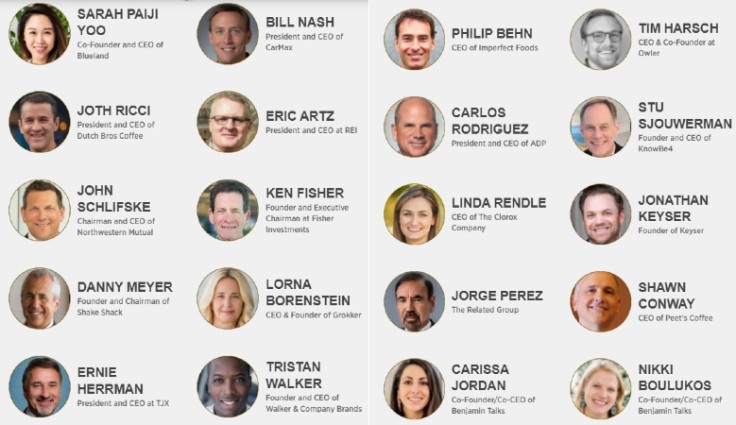Social Capital: Changing The World By Changing How The World Does Business
Almost a year ago, we set out to find select CEOs who respected people. We discovered a treasure trove of compassionate and caring capitalists.

Next month, we will be celebrating the IBT’s first official TOP 100 Social Capital CEOs for 2020-2021, and we could not be prouder or more excited. Thank you all for coming with us on this exciting journey.
As a run up to that incredible and exciting event, we are featuring not 10 but 20 Social Capital honorees this month, running the gamut of exemplary Social Capital behaviors for which they are being honored.
But, of course, they all have one thing in common: They understand that capitalism and business in general are done best when we realize and remember the value of people --and that the real bottom line is that people make profits happen.
We started this important journey almost a year ago, and we value and appreciate all of you who have taken the time to read and ride along with us. During that time we have looked at Social Capital from many different perspectives and angles. Here are the links to those articles again if you feel like revisiting them.
- SOCIAL CAPITAL: WHAT is it? DO you have it? HOW do you earn it? (September 2020)
- 10 Of America's Top CEOs Talk with IBT's Social Capital About How To Be Authentic (October 2020)
- The POLITICS of EMPOWERMENT in American Business (November 2020)
- Social Capital: The Ultimate Gift To America (December 2020)
- How America’s Top Social Capital CEOs Can Teach Us the Power of Kindness (January 2021)
- The New Revolution: Access (February 2021)
- The Power Of Knowledge – And The Leaders Who Spread It (March 2021)
- Leading In A Pandemic: CEOs Discuss How They Helped; What They Learned ( April 2021)
- Family Matters: 10 CEOs Who Support Our Most Important Institution (May 2021)
- Frontline CEOs — Who Aren’t Afraid to Get Their Hands Dirty (June 2021)
Along the way, we expected to meet incredible CEOs and business thought leaders who were leading the charge for a better world through business. But what we never could have expected is just how vast and powerful a network community of caring, high-level business leaders we would be tapping into.
We discovered a whole world of world-changing leaders who are there for their customers and their employees in ways that are transforming lives, families and communities. In fact, one could argue that corporations whose leaders understand how to do business right might be reaching a level of efficacy and compassion that rival major governments of the world. Some of our CEOs have even written about the ability for companies to surpass the potential good of government, at least when government is stuck, which it increasingly seems to be lately.
Well, regardless of whether you agree with that or not, we hope you all agree that when business is done right and with the full potential of Social Capital, life is better for everyone. And that, ultimately, that is what we are all here on this planet to do – to make life better for everyone. So, thanks to this month’s honorees for doing exactly that.
And be sure to check out the Top 100 next month!

Sarah Paiji Yoo: Blueland
Yoo’s company came directly out of her desire to protect humanity – first and foremost her son – from the dangers of plastic. That inspired her desire to protect the rest of us.
After doing research on what water she should use to make her son’s formula, she realized pretty much all water contains plastic – about 90%, according to Sarah. So, she decided to change the world for her son – and everyone else -- and set out to create cleaning solutions that were effective, non-toxic and free of single-use plastic.
“ I was horrified to learn that all the plastic I was throwing away was contaminating our water supply and generating hundreds of micro-plastics in the water and food I was feeding my baby,” Yoo shares. “I wanted to do my part to help, but it was impossible to find household products like window cleaner, lotion and toothpaste that didn’t come packaged in plastic.”
So how did she make a difference? By inventing and selling customers tablets they could pop into glass bottles with a bit of water, wait for them to dissolve, and then use the resulting hand soap or window cleaner just as they would any other but without the plastic bottle left over at the end. Blueland’s tablets not only cut down on plastic pollution but the fuel and carbon emissions to facilitate all the shipping of those bottles.
What we love most is that Sarah and Blueland made the polluting of the planet with plastic personal – and human – rather than strictly environmental. Not to be kicking environmentalism, but the whole idea of Social Capital is about putting the people back into the solution and the purpose of business. It’s a theme you will see in several of our honorees this month.
“ The oceans are being polluted by microplastics to the point where even seafood is becoming contaminated . . . About 14 billion pounds of trash is dumped into the ocean each year,” explains Sarah. “About a third of the fish that we consume is thought to have microplastics in their system. We are consuming, as adults, a credit card’s worth of plastic each week, so it is pretty scary,”
Sarah is doing all she can to make the world safer for her son and everyone else, and she reminds us how everyone else can, too, if every company in the cleaning supply sector used plastics re-use their packaging, “Our calculations would say that if everyone shifted to a re-usable system instead of consuming a new plastic cleaning bottle every time they need new cleaning products, we could save 100 billion plastic bottles from entering our landfills as well as oceans,” she says.
Way to go for the power of people-centered business.
Bill Nash: CarMax
CarMax president and CEO Bill Nash has steered the company to significant profitability, but what we are honoring him for in our Social Capital section is the bottom-line importance he places on maintaining a people-first culture in an industry not, historically, known for that.
Says Nash, proudly, “I always tell folks, when they’re looking for advice, they should think about their work environment. I say, ‘Look, you work for a very long time. You have to love what you do and love the people you work for.’ I absolutely do that here, so much so that it is very easy to get up in the morning and go to work. I don’t get up dreading going to work. I love coming to work, and I’m excited about where we’re going.”
Bill recalls CarMax’s origins with a small group of people selling used cars at a time when no one wanted to walk into a used car dealership, much less work for one. Becoming CEO was not on his radar; he simply wanted to run the best auction business he could.
It was his experience as an accountant at Circuit City that molded his view of corporate culture. “I remember coming home and telling my wife, ‘Wow, that culture is very different than any company I’ve experienced through my accounting days,’” Bill says. “The culture is what attracted me there. It’s almost as if they put on a show -- everybody seemed to be happy.”
Now as CEO of CarMax, he says, “The thing I continue to worry about: ‘How can I foster that environment?’” He recognizes that a big part of it is hiring the right people and instilling the values of continuous improvement. He notes that what “we’re actually delivering is an experience, and the experience is all about treating people the way that people should treat one another.
“It’s about integrity and transparency and treating people the way they should be treated.”
Well I guess if we can envision a world where even used-car dealerships are about integrity, then Social Capital can truly change the world.
Joth Ricci: Dutch Bros.
Dutch Bros. may seem like just another coffee purveyor cashing in the quick cup of fancy flavored Joe obsession, but it is much more. It is a community-centered, value-based business driven by a dedication to kindness, empowerment and helping others to succeed.
In fact, all that is what its leadership would rather it be known for – over and above its coffee. So much so that it’s in Dutch Bros.’ slogan, “Coffee is what we do, but it is not who we are.”
The real-life Dutch Bros., Dane and Travis Boersma, founded the company in 1992. And they consistently put their money and their efforts to proving that t hey really wanted to do good in a whole lot of ways beyond making a darned-good cup of coffee that has cars lined up around the block. The programs they have put in place and that have been augmented and/or supported by the current CEO, Joth Ricci, prove that.

“Dutch Luv” (this year on February 14th) gives $1 from every drink sold to help feed families in the community.
“Drink One For Dane” is a day when they celebrate the founder, Dane, who passed away from ALS, to support those who have ALS and their families. All 450 Dutch Bros locations will be donating a portion of their proceeds to support ALS research.
“Buck for Kids” day donates $1 of every drink sold to local youth-focused organizations in the community.
In general, through the Dutch Bros. Foundation and local franchisees, Dutch Bros. donates millions of dollars in philanthropy each year.
But all that being said, and not to bury the lead, we saved the best for last. Dutch Bros. is also extremely generous and caring to its own Dutch Community employees by exclusively allowing them the opportunity to run and own a Dutch Bros. location themselves. And that squarely hits the bull’s-eye when it comes to the whole Social Capital idea of how business, capitalism and companies can help people improve their lot in life.
Eric Artz: REI
Though Eric Artz is steadfastly committed to sustainability, as his company is built on a reverence for the value of the out-of-doors, that value is inexorably connected to the power of nature to touch, transform and heal the human soul. That powerful understanding of the importance of helping humans to be better and happier by also protecting and conserving the environment that fuels us and supports us is why we honor him here in our Social Capital section.
And access to the out-of-doors is not just a “nice to have” but has repercussions on quality of life: Science and research continue to prove that time in nature can and does have a positive impact on those suffering. REI has supported some of that research at universities like Cal Berkeley, UCSF, the University of Washington and Harvard, and it all leads back to a simple, powerful conclusion: Outdoor recreation must be more accessible for veterans as part of their overall care, especially those being treated for mental health challenges like PTSD.
For REI, this issue is greater than the products and knowledge it offers through its retail operations. In fact, sustaining the health of the company is intrinsically intertwined with sustaining the health of our planet. Says Eric, “Climate change is the greatest existential threat facing our co-op. I believe we do not have the luxury of calling climate change a political issue. This is a human issue. And we must act now.”
The company is involved in encouraging public policy that supports the goal of sustaining and increasing recreational opportunities and ensures everyone can benefit from time spent outdoors.
In fact, it has hosted bipartisan fireside chats with lawmakers, in hopes that, as Eric explains in one of his blogs, “these conversations can remind us that as a country, we can still find policies that bring people together.”
Back to Eric’s commitment to people, more than 70% of REI’s annual profits are invested back into the outdoor community through dividends to REI members, employee profit-sharing and retirement, and investments in nonprofits dedicated to the outdoors. As its website states, “Being a member-owned co-operative allows us to focus on shared values, not share value.”
John Schlifske: Northwestern Mutual
As the nation’s largest life insurer, one might incorrectly assume Northwestern Mutual no longer needs to be so attentive to its customers, or that it might get lost in the profits and lose site of the people. But nothing could be further from the truth.
In 2020, the company surpassed $1 billion in new life insurance sales, but, says Schlifske, “Our persistency rate -- the number of policy owners who stayed with us -- was 97%, the highest in the industry.” Clearly Schlifske is even prouder of the latter.
Moreover, the reason for the company’s record growth has a lot to do with its unique business model in the insurance world and its commitment to “helping customers achieve financial security and empowering colleagues.”
That’s because all of Northwestern Mutual’s profits return to its policy owners. That makes customers feel much more like they are on the same team with the company rather than a customer or a client. That goes a long way to creating a trust-like atmosphere, something of paramount importance to the CEO.
“Across industries, the notion of ‘trust’ is often at the forefront -- even rising to the level of being a buzzword in some cases,” he explains. “But I think we are having an incomplete conversation – and companies that implore customers to trust them have it backwards. They should be focused on being trustworthy -- which is significantly more important and reflects a much deeper commitment.”
That may be the reason John often jokes that, short of a religious career, his work at Northwestern Mutual is as mission-driven as you can get working within commercial financial services.
Ken Fisher: Fisher Investments
If only you could find an investment company that does not charge any commissions for trades . . . Oh! We just did. It also doesn’t hit you with hidden fees or extra service charges. Instead, it charges a competitive fee based on the size of your portfolio. That kind of simple transparency and honest trade made Fisher Investments a great pick to include in our list this month.
Despite the fact that Fisher doesn’t collect the kind of colossal commission that many other brokers charge, it still delivers every client top-notch service. Fisher’s clients receive a personal point of contact -- their Investment Counselor – who is committed to understanding them on a personal level and keeping their financial plan on track.

“Before we recommend anything, we get to know you. We ask questions about your goals and needs, your expenses, your health, your family commitments and more -- to better understand what you need your money to accomplish,” Ken explains. “This enables us to recommend a personalized portfolio designed to meet your needs and to help you enjoy the retirement you’ve earned.”
That’s all part of Ken’s philosophy of questioning “the hell out of everything that is regarded as conventional wisdom” – because, he says, “Most of our conventional wisdom is simply that and often wrong hand-me-downs from the past.”
And in an industry where conventional wisdom often promotes greed over the good of the customer, no wonder Fisher is a little bit different, in a great way.
He applies this philosophy to developing his workforce, as well. “We almost exclusively hire and promote from within. We by-pass the MBA world trying to hire kids right out of college and then motivate them to never leave. We ban concepts like ‘best practices’ (which are great if a lousy firm wants to become a B-firm) in favor of what we call ‘never-done-yet-practices,’ by which we mean to define what will become future trend changers others will have to follow.”
It’s a formula for expanding knowledge. As Ken says, “We like doing the new and never done.”
It’s also a formula for how to make a great Social Capital company.
Danny Meyer: Shake Shack
When Danny Meyer opened his first restaurant in the competitive New York market, he knew it needed more than great food – the secret was the people power.
He was intent on finding and hiring servers who loved their customers, and suggested innovative concepts like telling staff to take notes on customers’ favorite table or menu items dish.
Ultimately, he even came up with six emotional skills that he includes in what he calls "HQ," or "hospitality quotient." Those include kindness and optimism, intellectual curiosity, work ethic, empathy, self-awareness, and integrity. Identifying applicants with those skills is a key element in his restaurants’ hiring process.
What that resulted in was Meyer building an award-winning restaurant chain of more than 240 restaurants worldwide from the single restaurant he’d opened when he was only 29 years old.
And he built that empire on the realization that, no matter how big your company is or wants to be, it’s all about improving the human interaction and relationship.
Or, as Meyer puts it: "In the end, what's most meaningful is creating positive, uplifting outcomes for human experiences and human relationships. Business, like life, is all about how you make people feel. It's that simple, and it's that hard."
We agree.
Lorna Borenstein: Grokker
Empowering people with the tools to take control of their well-being is Lorna Borenstein’s goal, and through her company, Grokker, she helps businesses provide that opportunity to their employees.
Citing her experience running public companies and divisions in large public companies like eBay, HP and Yahoo, Lorna says, “I worked at these amazing companies that talked about work-life balance -- talked about, but didn't really create an environment where the employee felt supported and encouraged or that wellness and well-being actually mattered.”
So, she founded Grokker with the aim to provide all employees – from full-time to the oft-overlooked hourly and "gig" employees – access to well-being resources that instill a sense of purpose, belonging and balance. Grokker is a subscription-based website and app that publishes short health and well-being videos featuring activities like yoga, meditation, nutrition and more.

“I think if you're really going to build a company and you say you want your employees to be well but then don't do anything to make them feel that you really care, you haven't really quite done it,” Lorna says.
She believes they should – and can – create a 24/7 culture of health built on the double foundation of giving them permission to take care of themselves by providing them both the tools and the time and also providing the emotional support for them to do so.
That emotional support also has two legs: meeting everyone where they are with respect to their personal level of fitness and showing that they are recognized as individuals.
“The thing that people are so surprised about with us is that we provide very personalized experiences for everyone, no matter your level of fitness or competency,” proudly proclaims Lorna. “I think there's this misconception that there's a one-size-fits-all plan to wellness. There really isn't. You have to be able to personalize, so they know that you know what they care about,” Lorna explains.
No wonder she called her book, “ It’s Personal: The Business Case for Caring,” which was released the beginning of this year .
That kind of thinking is at the heart of Social Capital – and a better world for all.
Ernie Herrman: TJX
TJ Maxx may be known by most for quality products at extremely affordable prices, and as great as that is for customers, what is truly extraordinary is that its parent company, TJX, doesn’t cut corners in its supply chain to make that happen.
In fact, TJX is impressively committed to ethical sourcing to a degree that makes it a real model for Social Capital companies.
More than 1,100 associates in the company’s buying organization actively source products from more than 21,000 vendors and more than 100 countries around the world, and all are required to comply with TJX’s Vendor Code of Conduct that requires goods be manufactured and shipped not just in accordance with all laws, regulations and industry standards, but also with a commitment that goes way beyond the letter of the law to respect the rights of the workers who manufacture products.
TJX’s long list of requirements in its code of conduct include such expected items as no forced labor or indentured labor, but also prohibits vendors from asking employees to regularly work more than 60 hours per week, and requires that all overtime must be voluntary. Moreover, it goes the extra mile to make sure all vendors ensure subcontractors and any other third parties they use comply with the principles described in this Code of Conduct, which can complicate the buying process but is something TJX’s leaders believe is non-negotiable.
One of the most impressive of the company’s commitments was the Rwenzori Trade Project, a sustainable trade program they helped to develop in Uganda in 2008, when TJX Europe partnered with Save the Children with the aim of supporting education in the cotton-growing communities in the Rwenzori region of Western Uganda. They began with 12 communities, funding classrooms and teachers’ housing as well as donating money to supply educational materials, clean water, and toilets but soon discovered that much more was needed.
“ As our program evolved, we learned that to sustain a long-term impact, these communities needed ways to generate greater and more reliable income for their families,” TJX explains on its website. “We began working with local partners to help create a sustainable trade program. Our goal was to help families living in this area increase their incomes so they could better care for themselves and send their children to school.”
In 2011, TJX established a trade project to support the production of cotton, coffee, cocoa and handmade crafts. Together with local partners, they taught farmers not only how to develop better crop yields but a range of business skills from bookkeeping to product development.
What was the result?
According to TJX, “Higher earnings, combined with consistent sales of their crops, give families in the region a more reliable and increased income stream, helping them pay for basic needs, school fees, and other necessities. We believe our support has made a difference.”
So do we!
Tristan Walker: Walker & Company Brands
Allowing people to be their authentic selves is at the heart of Tristan Walker’s creation of his Walker & Company Brands. The company’s mission is to make health and beauty simple for people of color. “I started years ago with Bevel out of a frustration that I couldn’t find the right products for myself,” he explains, noting that the retail experience for people of color at that time left a lot to be desired. “This is my opportunity to not only educate the majority of the market but to also fill a void.”
Noting his is the first – and only – brand to launch a line for curly and coily hair, Tristan says, “Folks have been attempting to cater to this market for centuries -- we just felt they weren’t doing the right thing for centuries. Our goal is to showcase empowering messages through our brands.” Tristan became the first Black CEO under the Procter & Gamble umbrella since its founding in 1837, and his flagship brand, Bevel, also became a category leader with distribution in Target and Walmart stores across the nation.
The population he aims to serve is more than a market. Tristan is also the founder of CODE2040, a program that matches high-performing Black and Latino undergraduate and graduate coders and software engineering students with Silicon Valley startups for summer internships.
“The aim and mission for our Fellows Program is to support emerging Black and Latinx tech talent. We provide the students with all the tools to be successful. We’re in the innovation economy, and companies need to hire talent that understands that. They need to recognize the benefits of hiring a diverse talent base,” Tristan explains. “I see the work that we’re doing here as the greatest opportunity of my lifetime.”
Being authentic requires being proactive with respect to what interests and motivates him. As he says, “A lot of people say they won’t start because they need extra validation from others, who most of the time can’t see what you can see. And people think they need to secure a certain level of funding before moving forward with an idea. How much has been left on the table because of people not simply starting?” The advice he gives to others is what he, himself, follows: “Just start.”
From a Social Capital perspective, there can be no better way to show support for diversity than by empowering individuals in diverse populations with a way to make life better for them. And that’s exactly what Tristan did.
Philip Behn: Imperfect Foods
Imperfect Foods found the perfect formula for how to care for the environment by making everyday life better for people through its mission to reduce food waste by saving perfectly good but ‘imperfect’ produce targeted for the dumpsters and turning it into affordably boxed groceries delivered to people’s doors.
For Philip Behn, being CEO of Imperfect Foods is a convergence of two of his high-priority concerns: providing food where it is needed and not letting it go to waste, and helping reduce the carbon emissions related to food waste – which is estimated at more than 70 gigatons annually by Project Drawdown.
“Joining the Imperfect Foods team has been a wonderful opportunity to merge my personal values and business goals. With like-minded, mission-driven team members, I can continue to drive the business in crafting a perfect experience for the customer, and one that is kinder to the environment and suppliers,” says Philip.
He credits his parents, who championed sustainable farming, renewable energy and environmental protection, for instilling in him a deep appreciation for nature and fostering his dedication to protecting the environment. But his dedication to the Social Capital concept of serving people is what makes Imperfect Foods’ business model complete and effective and successful.
“I also believe very strongly in the power of customer experience,” he adds. “Our goal to eliminate food waste can only happen as we work together – and our team is committed to ensuring that we cater the grocery shopping experience in a way that is optimal for customers as well as kinder to the environment and food suppliers.”
At Imperfect Foods, Philip is empowering customers to be part of the solution by giving them better and more affordable food solutions. This is the perfect Social Capital solution, putting improving the lives of people at the heart of the issue.
“I think the best business ideas are those that solve a real problem,” he says. “And the best businesses are those that are able to solve a problem efficiently, reliably and with the best customer experience.”
That commitment to people in general extends to his employees as well, as it should. Empowerment is at the heart of his philosophy toward leadership of his people, and his sincere dedication to that is evident in what he does and what he says.
“Personally, I am committed to developing talent and building a resilient, caring and inclusive culture at Imperfect Foods,” says Philip, explaining: “‘Resilient’ because change keeps accelerating and we are confronted with new challenges and opportunities every day. ‘Caring’ because as human beings we crave to belong, be listened to and be treated with respect. And ‘inclusive’ because that is the only way to unlock the full potential of our committed employees and diverse workforce.”
Tim Harsch: Owler
Owler describes itself as “ the second largest business community in the world, next to LinkedIn,” and is a Social Capital pick because it lets its users decide what’s valuable instead of telling them what is worthy of being read. This puts individual respect and empowerment at the forefront of its business model.
Led by Tim Harsch, who previously founded Jigsaw, Owler provides business information that is supplied and curated by an active community of more than 3.5 million business professionals that include 96% of the Fortune 500, and 73% percent of highest-growth companies. Each month, members contribute hundreds of thousands of insights about the companies they work for, including revenue estimates, CEO approval ratings, number of employees and much more.

The algorithm for what is trending on Owler comes from what the users think is important. Believe it or not, this is a revolutionary idea in today’s world of shifting social media bias because this is not the case in typical media platforms. Even though “likes” are registered and openly displayed on most platforms, in those other venues that’s not what gets you highlighted or promoted by the moderators.
Normally, with most social media, there is a team of very opinionated people, usually with a singular learning perspective – be it politically or commercially motivated -- monitoring what is being said and removing, adding and controlling content. This is exactly how and why Facebook is in so much trouble nowadays.
But with Owler’s model, promoting and allowing the actual subscribers to figure out what to add and trusting them to distinguish and prioritize what they then, personally, want to see is refreshing because at the end of the day it showcases a respect for the individual’s opinion – and, ultimately, for the individuals themselves.
You choose what is important to you rather than a bunch of tech IT people deciding for you. In other words, Owler sees people as valuable and worthy of respect. Sounds like a good Social Capital platform to us?
Carlos Rodriguez: ADP
ADP is 100% for diversity – because of a belief it will help to find the brightest and best that humanity has to offer, putting the person back into the concept of diversity.
“The evidence is overwhelming that companies with diverse teams and diverse leadership outperform companies with more homogenous workforces,” says Carlos Rodriguez, CEO of ADP. “They are better at examining and solving problems and, even more important, they are better at understanding customer needs and addressing them.” With this as the end-goal, access to career pathways is crucial for all demographic groups.
In fact, Carlos believes businesses have to look for the brightest employees from all demographic groups. “An open and inclusive environment allows the best people to take the most important jobs. That’s incredibly important for a successful company,” Carlos said in 2012 after ADP was named to the DiversityInc Top 50 for the third year in a row.
The organization Carlos heads is comprised, as of 2020, of more than 55,000 employees and operates in 140 countries. Under his leadership, it accelerated its transition from payroll processor to become a human capital management services provider. The company’s growth has been as a result of leveraging technology to design a more personalized world at work.
“At ADP, diversity is at the heart of what we do and who we are,” Carlos says, noting, “We are working with several external diversity partners to help us attract diverse STEM talent to ADP.” Partnerships include The Anita Borg Institute, Women in Technology International and Management Leadership for Tomorrow.
“Through our partnerships, we have met countless inspiring young people who are going to drive the innovations and businesses of tomorrow. Having grown up in an era in which companies can develop from concept to success very rapidly, they exude a sense of empowerment and motivation that is unprecedented. As part of this, they seem less daunted by traditional limitations on what technology can do.”
Carlos has proven that diversity makes good business sense, and the good business is diverse – proving once again that Social Capital is isn’t just ethical but practical.
Stu Sjouwerman: KnowB4
KnowBe4, the provider of the world’s largest integrated security awareness training and simulated phishing platform, is used by more than 26,000 organizations worldwide. Founded by data and IT security expert Stu Sjouwerman, KnowBe4 helps organizations address what Stu sees as a critical part of cyber security: the human element.
It may be seen as ironic that the human element is so important to this hardcore tech company. Actually, it’s the whole idea behind why Stu started the company. Even when the “perfect” software could be created to solve a problem, human error was still the main issue in so many cases.
Stu explains, “The idea was that the human was the weak link in IT security. But how are you going to manage that problem?”
So, a huge part of what his company focuses on is aiding, educating and improving human behavior – and inspiring people to do the right thing is a big part of that.
“Ethics is what you do when no one is looking,” Sjouwerman says.
Stu has won the Employees’ Choice Award, honoring top CEOs, from Glassdoor, ranking in the top 10 in the U.S. in the small and medium business category, with a 98% satisfaction rating. Employees commonly comment that “Our CEO, Stu, really has what it takes to be the best leader in this industry” and describe the company as having “open communication and a fun work environment.”
Along with appreciation of the human, knowledge is the key commodity at the foundation of Stu’s work – which is why he focuses on educating the workforce.
This approach sets his company apart from those offering anti-virus products. In fact, he observes, “Attackers are getting better and the anti-virus market can’t keep up.” He believes relying on it gives a false sense of security.
He also wants to make an impact on smaller businesses, educating those owners as well, believing they overlook the importance of security because they don’t think of themselves as conglomerates that would need it.
For putting the people back into tech we are proud to honor Stu as a Social Capital leader.
Linda Rendle: Clorox
Linda Rendle was only 29 years old and the most junior manager in a meeting of Clorox Co. executives when she spoke up to say the company wasn’t being ambitious enough in its approach to launching a line of earth-friendly cleaners.
Her confidence and arguments convinced them and the company increased its whole line of Clorox Green Works products. Sales soared.
“Normally in the room, I’m the person trying to make things bigger,” says Rendle, “You have to be absolutely unafraid of having an opinion and to advocate for that opinion.”
Fortunately for the rest of the world, this supremely confidant, smart and energized executive took the reins of the company a little over a year ago, right before the pandemic and during a period of lagging sales. However, she soon found herself facing the opposite problem as she was forced to change her focus from getting more customers to getting more products on the shelves when the ensuing unprecedented pandemic-fueled demand for disinfecting wipes and sprays exploded.

She and Clorox stepped up to the plate in lifesaving ways. That led Rendle -- 42 years old, one of the youngest executives to lead a Fortune 500 company and the first woman to run Clorox -- to champion a new slogan and a new direction for the company. The new slogan was “We champion people to be well & thrive every single day,” and the new direction more outwardly focused on a goal that has always been important internally – improving people’s lives. “We're values-led, putting people at the center of everything we do.”
Also this year, The Clorox Company has achieved its goal of 100% renewable electricity for its U.S. and Canadian operations four years earlier than originally planned. That’s a pretty big deal for a company the size of Clorox, as it’s estimated to avoid approximately 180,000 metric tons of carbon dioxide emissions each year -- the carbon impact of the electricity for 30,000 U.S. homes annually.
“ I joined Clorox because it’s a company that is values-led and genuinely cares for people and communities,” says Rendle.
Well, we have a good feeling about Rendle and think this is just the beginning for this compassionate and people-focused CEO.
Jonathan Keyser: Keyser
“I dream of a world where people help each other selflessly and without regard for personal gain,” says Jonathan Keyser. What an inspiration for us to honor him as a Social Capital-pioneering CEO for incorporating kindness into business!
The commercial real estate world in which Jonathan developed his career was almost the diametric opposite of his dream – generally viewed as cutthroat and dog-eat-dog. So, he made the calculated move to change course, developing a philosophy around CRE that he explains in multiple books, including “You Don’t Have to Be Ruthless to Win” and “The Gift of Growing Up Selfless,” that has helped his company become the largest occupier services commercial real estate brokerage in Arizona.
“ My parents raised me to be selfless, but I didn’t fully realize the gift of that mindset until I was much older and working in the ruthlessly competitive world of commercial real estate,” explains Jonathan. “It took a personal reinvention for me to see that you don’t need to be ruthless in business to win. In fact, selfless service leads to the most extraordinary gains of all, personally and professionally.”
Talk about a perfect endorsement of the Social Capital concept. And his ensuing success was an even greater endorsement. Soon after Jonathan realized he was trading his values for success, he reinvented himself as a “selfless leader” and, incredibly, succeeded in building one of the nation’s fastest-growing commercial real estate brokerages, becoming more successful than ever.
Jonathan’s goal now is to train and teach people how to selflessly serve clients and the community – and then inspire and empower them to teach others how to do the same. “It is precisely this commitment to our clients that helps us accomplish results that others cannot,” he says. “I, personally, abandoned millions of dollars of ownership interest in a growing and profitable national real estate firm, and other Keyser members’ sacrifices have been just as great.
“This just isn’t another real estate advisory firm,” Jonathan emphasizes. “There are plenty of those. This is a firm intent upon changing the world, one act of service at a time.”
Jorge Perez: The Related Group
“The key to our success has been the same since day one: Each and every project must benefit its surrounding community, not just its respective residents,” says Jorge Perez, chairman, CEO and co-founder of The Related Group.
Jorge built his fortune by building and operating low-income multifamily apartments across Miami. The firm became the largest affordable housing builder in Florida by the middle of the decade and has become one of the largest Hispanic-owned businesses in the United States, with a development portfolio in excess of $40 billion in 40 years, and projects now also internationally.
Answering the demands and desires of a new generation, The Related Group continues to exceed the expectations of residents and communities at every turn. Following Jorge’s lead, Related seeks to educate and inspire, incorporating museum-quality art and noteworthy cultural experiences throughout its developments. Related properties have been recognized time and again for their visionary designs and innovative development of luxury condominiums, market-rate rentals, mixed-use centers and affordable properties – often in emerging neighborhoods that enhance the lives of all its residents.
In fact, The Related Group has earned international status for its visionary designs and development of luxury condominiums, market-rate rentals, mixed-use centers and affordable properties – often in emerging neighborhoods that impact the lives of all demographics. With his projects, Jorge is creating access to basic needs of individuals.
“Our team’s ambition and commitment to excellence are our biggest differentiators. Each of our developers is always striving to out-do their last project and those of their peers, and the results speak for themselves,” Jorge says. “This approach encourages project leaders to develop a strategy that extends far beyond the building’s walls, resulting in our museum-quality art collections, our partnerships with architects and world-famous interior designers, the integration of mixed-use components and more.”
That kind of attention to detail, to quality and excellence in creating not just housing but proud homes for those often relegated to functional living answers the highest call of capitalism to make life better for all.
Shawn Conway: Peet’s Coffee
Peet’s is known as a coffee company, but knowledge is as important a commodity to its leadership, from founder Alfred Peet graciously sharing the fruits of his earnest study and experience with three eager young entrepreneurs (whose resulting enterprise is also well-known today as Starbuck’s) to current efforts to position everyone involved in coffee to thrive -- today and beyond. As Peet’s website states, “We work alongside farmers to offer training and educational opportunities, support farm community initiatives and invest in coffee plant science.”
In 2012, Peet’s was involved in founding World Coffee Research with other forward-thinking companies, the only organization applying advanced agricultural science for coffee on a worldwide, collaborative basis.
Shawn leads the company as its chief executive officer, guiding Peet’s 5,000 employees and business across all channels -- retail, CPG, food service, office coffee, e-commerce -- and subsidiaries, including Intelligentsia Coffee, Stumptown Coffee and Revive Kombucha. Shawn has been with Peet’s for a decade, serving previously as the chief supply chain officer and chief operating officer, and overseeing many essential departments, including Coffee and Tea, Research & Development, Product Development, Logistics, Strategic Sourcing, Procurement, Quality Assurance and Roasting Plant Operations.
Continuing the legacy of his predecessors, Shawn maintains Peet’s operating standards to conduct its business honestly and ethically wherever it operates. This is not only within its own stores, where employees are expected to act with integrity and honesty in all matters and follow all applicable laws, but throughout its supply chain, where managers are expected to ensure that all vendors conform to its standards when working for or on behalf of Peet's.
We are honoring Shawn as well as Peet’s leaders before him who helped bring the company to this point as Social Capital CEOs.
Carissa Jordan and Nikki Boulukos: Benjamin Talks
Fate, purpose and a great Social Capital concept all came together to improve people’s lives with this company in a way that even the Benjamin Talks founders Carissa Jordan and Nikki Boulukos could never have predicted.
“ As young, fresh-out-of-college analysts at Goldman Sachs, our co-founders and co-CEOs would have never guessed how their paths would converge nearly a decade later,” reveals the company website, and it’s no exaggeration.
After venturing out into the finance and startup world, these two visionaries wound up, amazingly, living right down the road from each other in the same Long Island suburb, both raising families and both confronting the challenges of how to talk to their kids about finances. Carissa Jordan and Nikki Boulukos were two moms with backgrounds in finance who realized there was no dependable go-to for teaching young children about money.

Soon, Benjamin Talks was born. The name is a reference to Benjamin Franklin, who had a thing or two to say about money and how to earn it in his essay “The Way to Wealth,” a discussion of work ethic and frugality. And Carissa and Nikki hope to continue that conversation in a way that enables parents to help children understand.
Benjamin Talks aims to make finance kid stuff for the next generation. With the innovative Benji Bank and creative, digestible content, Benjamin Talks attempts to engage children’s interest in order to educate and empower children to understand their worth and how to leverage it regardless of where they come from or where they go in their lives.
“ Want the tools to make your kids fluent in finance?” its website asks. “We are taking the the taboo out of money talk, one weekly email at a time. Join the conversation!”
Carissa recognized the power of understanding money from a very young age. As the oldest of three children in a blue-collar household, Carissa began tutoring and babysitting by 12 years old. She quickly taught herself how to budget and always stuck to a financial plan.
Yet, there are literally no resources out there to teach children that young.
“ Our children’s exposure to financial literacy currently ranges from inconsistent to nonexistent,” Carissa and Nikki explain. “Additionally, most of the resources out there target teenagers and beyond. We believe this is far too little, far too late.”
They point out, astutely, that studies show money habits -- as well as learning about planning, delayed gratification, attitudes towards spending and saving and giving -- all take place early in childhood, before the age of seven.
“ Yet at least half of all parents, (yes, nearly 50%!) say they rarely, if ever, discuss family finances with their children,” reveals the founders. “Many simply don’t have the language or resources to answer their children’s questions on the subject. This is where we come in.”
“ Financial literacy should not be a luxury,” Boulukos says. “It’s time we take the taboo out of money talk and give every child, no matter what their circumstances, the financial tools they need for life.”
Hallelujah for Social Capital
© Copyright IBTimes 2024. All rights reserved.





















